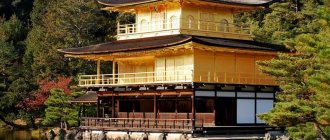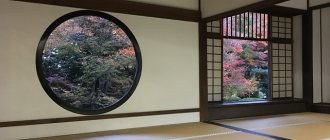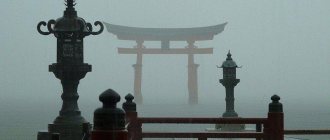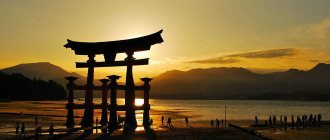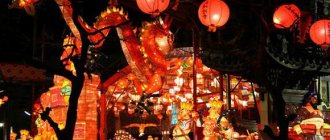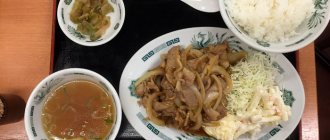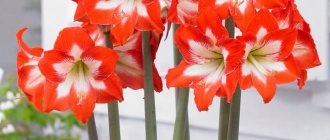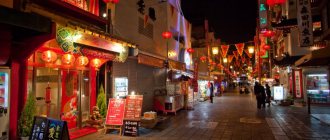God Ebisu - patron of farmers and fishermen
The only god of the seven that originated in Japan, Ebisu is known as the god of fishermen, farmers and merchants, and is very popular among people in this industry. He is often depicted holding a fish in his left hand, a fishing rod in his right, and wearing a pointed hat. Beer and the Ebisu train station also come from the name of this god.
Ebisu is also a god who personifies the virtue of honesty. Perhaps thanks to a lucky catch, Ebisu is always smiling. In later tradition, Ebisu is identified with Hiruko, the first descendant of the gods Izanagi and Izanmi. Traditionally, Ebisu is celebrated annually on October 20th.
Seven gods of happiness in Japan
In Japan, after the New Year holidays, somewhere before mid-January, it is customary to visit temples and pray to one of the favorite gods of the Japanese - the seven gods of happiness (luck) - shichifukujin. These gods originated in Japan, in the ancient city of Kyoto around the 14th century during the Muromachi period, they are not "native" to Japan. The gods came from different countries: China, India, one god Ebisu is Japanese, and from different religious movements such as Shintoism, Taoism, Buddhism and Brahmanism.
The number seven is a sacred number in both China and Japan. Scrolls on which the seven gods were drawn in the 14th century could be found in Kyoto on the walls of teahouses; taking into account the Japanese flavor, the scrolls were decorated and began to gain popularity among the population. The Seven Gods of Fortune are deities who bring good luck, prosperity, wisdom, wealth and longevity. According to legend, they arrived to the shores of Japan on the ship of fortune "Takarabune", on a ship filled with treasures, rice, in addition to material wealth, the ship was filled with wisdom, longevity, health and good luck.
But at first the gods existed separately from each other, and later they were united into a single group of cheerful and cheerful gods. The composition and number of gods in this magnificent seven changed and only in the 17th century this group was formed in the form in which it is presented today. The seven gods represent the seven virtues - longevity, wealth, sincerity, dignity, fame, generosity and friendliness. The seven gods are: Ebisu, Daikoku, Bishchamon (or Tamonten), Benzaiten, Fukurokuju, Hotei and Jurojin.
Three gods - Daikoku, Bishchamon and Benzaiten - were borrowed from India, Hotei, Jurojin and Fukurokuju came from China, the god Ebisu is the only one of the seven gods of Japanese origin. According to the ancient legend, Ebisu is the first-born of the first and main gods of Japan Izanagi and Izanami, he was born without bones for which he was named Hirako - tadpole, shortly before his third birthday he was carried away on a boat to the sea. After long wanderings on the waves, his boat washed up on the shores of the island of Matsumae (now Hokkaido), where he was picked up by the Ain (aboriginals of the island) Ebisu Saburo. Overcoming great difficulties, Hirako grew arms and legs and turned into the god Ebisu.
In Japan, a separate temple was built for each of the seven gods, and these temples are located not far from each other, so that during the pilgrimage period, believers can move from temple to temple and pray to the gods of good luck. As a rule, during the period of mass visiting of temples, there are signs between them, so that even visitors can easily find their way to all the temples of the seven gods, but at this time of year you can’t go wrong if you just follow the crowd that follows in front of you, because Everyone has the same route - the sanctuaries of the deities of luck.
Let's get acquainted with the kind, cheerful and generous deities so revered by the Japanese.
Ebisu is the most beloved god of the lucky seven by the Japanese. He is always depicted wearing a hat, holding a fishing rod in his right hand and a tai fish (sacred fish) in his left. Initially, it was the god of fishermen, then began to be revered by farmers and traders. God Ebisu also takes care of the health of young children and is also believed to ensure safe travel.
The Japanese who need good luck in trading, fishing or farming always try to visit the Ebisu Shrine, pray and buy an amulet. In temples, everyone will be sold a branch of bamboo for 3,000 yen, which symbolizes permanence and stability. Bamboo is a symbol of the god Ebisu; in addition, the temple servants will offer other talismans and decorate a bamboo sprig with them. This bamboo is installed at home and helps its owner in business throughout the year. At the end of the year, the bamboo is taken to the temple and burned there.
Daikoku - the god of wealth and household, particularly in the kitchen, is the patron saint of peasants. He has a flat black hat on his head and a wide smile on his face. He is depicted standing on two bags of rice, with the bag over his shoulder and a wish-granting hammer. With each tap of the hammer, what he wants appears and coins fall, and behind his shoulder in a bag he has wisdom and patience, and perhaps treasures or rice. Daikoku, like Ebisu, is worshiped by farmers and these two gods are often depicted together, as they bring prosperity and wealth.
Bishchamon (or Tamonten) - he is depicted in samurai armor, with a spear in one hand and a small pagoda in the other, symbolizing the divine treasury. He is the patron of warriors, lawyers and doctors, and brings good luck and wealth.
Benzaiten is the only female among the gods of luck and symbolizes wisdom, love, art, eloquence and beauty. The Benzaiten figurine is depicted with a traditional Japanese lute - a biwa; its companions are always a snake and water. Benzaiten is also considered a water deity. There is another image of the deity - a warlike eight-armed goddess holding spears, swords and other weapons in her hands. But the Japanese are closer to the charming and beautiful patroness of everything beautiful, and therefore this particular image has taken root in Japan. And people of art come to Benzaiten Temple to pray and receive inspiration.
Fukurokuju is the god of wisdom, luck and longevity. He is depicted with an outstretched head, accompanied by a black deer; it is believed that if the deer has lived for 2000 years, then it becomes black, or a crane with a turtle. Fukurokuju is the lord of the southern polar star. He is often depicted holding a fan. He is the only one of the seven gods who can resurrect from the dead with a wave of his fan. God can also ward off evil forces with the help of a fan.
Hotei - like Daikoku, is considered the god of wealth. But he is also the god of laughter and happiness, compassion and good nature. He is depicted as a laughing fat man with a bag of rice. Hotei loves children and helps the weak. There is a belief that if you make a wish and rub your belly three hundred times, your wish will definitely come true. Hotei, the only one of the seven gods, embodies the image of a real-life wandering Chinese monk in the 10th century, who was a fortuneteller and his prophecies were sure to come true.
Jurojin is the god of longevity, happiness and immortality; the attributes of his company are a deer, a turtle and a crane - symbols of longevity. He is depicted with a smile on his face, wearing a cap typical of scientists, holding a staff and a scroll in his hands, which indicates the life spans of all creatures living on earth. Jurojin is also depicted drinking sake; he is a cheerful, cheerful god who is not alien to worldly pleasures. Jurojin is the patron of scientists and teachers.
There are regional differences in shchichifukujin. In each region of Japan, the description of the deity and its characteristics may differ, but what all gods have in common is that they bring good luck, prosperity and wealth.
As a rule, each deity has its own temple, but there are places where two deities, or all seven, can coexist in one temple. There are more than 100 such temple complexes dedicated to the seven gods of luck in Japan; in Tokyo alone, more than 20 shrines are dedicated to the deities of happiness and for the period until January 15, only one temple can be visited by up to 30,000 pilgrims.
God of Wealth Daikoku
God of wealth and prosperity Daikokuten or sometimes Daikoku. This god is the Japanese equivalent of Makahala or more commonly known as Shiva, who originated in India and came to Japan in the 9th century. Daikokuten is often depicted with a hammer in his right hand and always smiling, standing on bales of rice. There is also a myth that Ebisu is the son of Daikokuten. These two are often placed together with a third god, Fukurokuju, making up the "Three Gods of Fortune".
Seven Gods of Fortune in Japanese Culture
Hello, dear subscribers and everyone who stopped by!
In today's post I want to talk about the seven gods of happiness and luck from Japanese mythology. Beloved and revered by the Japanese, they are widely reflected in Japanese art - okimono (figurines), netsuke, engravings, jewelry with images of gods made of various materials (silver, porcelain, clay, bone, porcelain)…
Shichi Fukujin, Seven lucky gods - seven gods of luck, revered in Japan. Each of them symbolizes a specific virtue: Honesty, Wealth, Dignity, Kindness, Longevity, Happiness and Wisdom. They were chosen from Hindu, Buddhist, Taoist and Shinto gods or saints, and settled into the Japanese folklore of gods. Believed to have been grouped together around the 17th century.
Ebisu is the God of fishing, shipping and trade, and is the only one having its origins in Japan. Ebisu is very popular among those who work in the food industry (farmers, sailors, hunters.) He is often depicted with a fishing rod in his right hand and a large sea bream in his left. Virtue: It represents honesty .
Daikoku (D aicocu). Originally a Hindu warrior deity named Mahakala, in Japan he became the god of wealth and prosperity. He is depicted with a happy smile, a bag on his shoulder filled with money, and a magic hammer in his hand, standing on two bales of rice. Virtue: Wealth .
Bishamonten, also from Indian Buddhism, he is the God of warriors (but not war!) Is a God for protection from evil. Almost always dressed in armor, with a fierce gaze and standing over one or two demons, symbolizing the defeat of evil. In one hand he carries a weapon to fight against evil forces and suppress his enemies. Virtue: dignity (courage ).
Benzaiten, often shortened to Benten , was originally a Hindu goddess of water, the only woman among the seven gods. In her Japanese concept, she is the Goddess of arts and knowledge. She was depicted as a beautiful woman dressed in a Chinese style dress and playing the biwa or flute. Virtue: kindness, benevolence.
Fukurokuju , came from the Taoist-Buddhist traditions of China. He is the God of wealth, happiness and longevity. He appears with a very elongated forehead and a long mustache, wearing the usual clothes of a Chinese scholar, holding a cane, and with a scroll tied to him. He is the only one of the seven who has the ability to resurrect the dead. Virtue: It represents longevity .
Derived from Chinese beliefs, Hotei (or Budai ) is the God of Happiness and Abundance. He was supposedly a specific individual, the Chinese hermit Budaishi (before 917). He is represented as a Buddhist monk with a smiling face and a huge belly; holds a bag and a wooden staff, usually sitting on his bag. Outside of Japan, he is known as the " Laughing Buddha ". The virtue it represents is happiness .
Jurojin. He is the God of Wisdom and is usually represented as an old man wearing a hat with a long white beard, holding a staff with a scroll tied to it. He is often confused with Fukurokuju as both are presented in a very similar appearance. Virtue: Wisdom .
Let's admire these masterpieces together:
And this rare Toshikane bracelet went on sale today in my store:
You can buy it using this link
Your Lesica
Goddess of fortune and wisdom Benzaiten
Benzaiten is a goddess of Hindu origin and is the only female goddess. She is the goddess of love, fertility and wisdom. She is usually depicted playing the biwa, a type of lute or guitar, and riding a dragon or sea dragon, which she married according to some traditions, thereby ending the dragon's attacks on Enoshima Island. For Buddhists, she is the patroness of wealth, literature and music, as well as the embodiment of femininity.
God of War and Victory Bishamonten
Bishamonten is the god of war and victory, the patron of warriors and protector of the righteous. He is depicted wearing Chinese armor and holding a spear in one hand. In his other hand he holds a small pagoda, which represents a treasury. Traditionally he is associated with the Hindu and Buddhist deity Kubera or Vaishravana. Shiga, a temple town founded around the 6th century AD, was dedicated to the god in gratitude after Shotoku Taishi won a battle at the site.
Daikoku - god of prosperity
various variants of Daikoku
Daikoku is considered the god of prosperity and wealth and is one of the seven gods of happiness in Feng Shui. Such a talisman will bring prosperity to the house and will be the keeper of the hearth.
As a rule, he is depicted with a flattened, eccentric cap on his head, with a mallet in one hand, a bag (containing magical rice - bringing wealth to the house) in the other, and a rat (or even rats). Moreover, in most cases, you will not see a rat on the Daikoku and Ebisu mascots (more often it is depicted on a single Daikoku mascot), because it supposedly sits in a bag of rice and when it gnaws a hole in it, it spills out, giving people wealth.
God of Scientists and Sages Fukurokuju
This god is of Chinese origin, but his Japanese name means happiness (fuku), wealth (roku) and longevity (ju); therefore he is known as the god of wisdom and longevity. Traditionally it is believed that he was once a mortal and lived as a Taoist sage, and is usually credited with the ability to resurrect the dead. He is depicted as short in stature, but with a very high forehead.
God of fun and prosperity Hotei
Hotei (or Hotei-osho) comes from China and represents frugality and philanthropy, as well as prosperity. This is the god who is portrayed in the most unflattering light as a fat, bald and rather unkempt Buddhist monk with a large exposed belly and large swollen earlobes. However, always giggling and often surrounded by children, he is perhaps the happiest of the seven gods and lives up to his Chinese nickname "Laughing Buddha".
Japanese traditions of depicting gods
Although the gods go back much further, in Japanese tradition the first depiction of the gods as a group of seven people dates back to the 16th century AD. e. commissioned by Tokugawa Ieyasu (1542-1616). Gods are a particularly popular subject of Netsuke, Japanese miniature sculptures carved most often from ivory and precious hardwoods and originally used as switches.
In addition to being presented individually, the Shichifukujin are also depicted as a group on their treasure ship. The ship is usually depicted with a single mast and a sail on which is depicted a gold coin or a Japanese character for good luck. The ship has a dragon's head at the bow and can be depicted with a crane on top and a turtle below, all three creatures being auspicious symbols.
The Legend of Ebisu
different variants of Ebisu
Ebisu, like Daikoku, is one of the seven gods of happiness. But unlike the others, it is of Japanese origin.
According to myths, Ebisu was the son of the gods, the ancestors of the Japanese islands. He was born handicapped, without arms, without legs, and generally without bones. His name was Hiruko no Mikoto (or Hirako), which meant “tadpole.” At a very early age (legend says that he was not yet three years old), he was carried out to sea on a reed boat (according to another version, his parents themselves let him go, believing that it would be better for him this way).
After long wanderings and overcoming many difficulties, Hiruko did not die, he remained alive, and his boat washed up on the shore of the island of Hokkaido. There he was picked up by an Ebisu fisherman named Ebisu Saburo. He fell in love with the little “tadpole” as his own son, raised and educated him. At the age of 3, the boy grew arms and legs. Hiruko became a real full-fledged deity with the new name Ebisu. And he began to help people. Especially fishermen and artisans.
Talisman, or as in Japan they usually call such small figures of gods - netsuke, Ebisu is depicted as a cheerful, laughing old man in a cap, with a fish in his hands, and not just a simple one, but the sacred fish Tai (carp). Tai in eastern countries is a symbol of great luck, spiritual achievements, and serves to activate good luck in various areas of life. In addition to the sacred fish, he may have a fishing rod or fan in his other hand.
outdoor statues of Ebisu (left) and Daikoku (right)
In Feng Shui, Ebisu is considered the god of fishing and hard work. This is not surprising given its long association with the sea. Have you heard the expression: “You can’t pull a fish out of a pond without difficulty.” So here it is, it truly reflects his essence. Based on this, Ebisu patronizes everyone who is engaged in some kind of physical labor (peasants, artisans and even merchants). At home, like Daikoku, he acts as a keeper of the hearth and an excellent assistant in the kitchen. Also because of his miraculous healing in childhood, Ebisu is considered the patron saint of young children.
